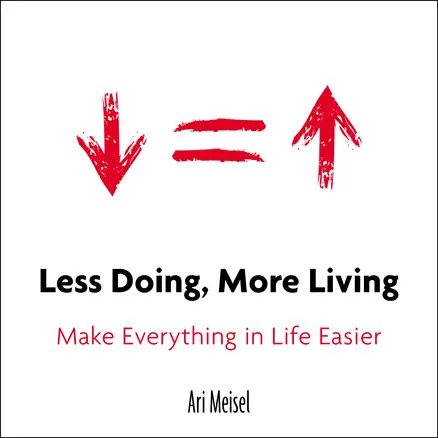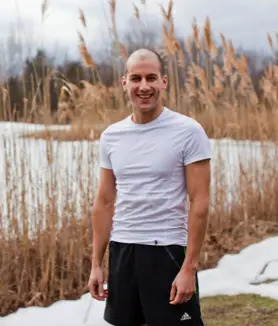Author Ari Meisel discusses how his struggle with Crohn’s disease led him to develop a system for managing his stress. His book Less Doing, More Living outlines a series of 21st century life-hacks designed to help individuals and spend more time doing the things they enjoy.

We’ve all heard the phrase “less is more.” But our modern lives constantly demand more from us—more time at the office, more errands, and more media to keep up with. While we’d love to do be able to do more of the things we care about, there never seem to be enough hours in the day. And yet the stresses seem to build continually.
For author Ari Meisel, life came to a head when he was diagnosed with Crohn’s disease in 2006. Fueled by his desire to take control of his life, Meisel found a way to manage his stress, his illness, and to make time for the things he values in life. In his book Less Doing, More Living: Make Everything in Life Easier (Tarcher/Penguin paperback; on-sale April 7, 2014), Meisel offers a series of “life-hacks”—21st-century tools designed to help people automate and outsource mind-numbing tasks, increase their productivity, and streamline their lives.
Meisel’s Less Doing philosophy offers a new framework for businesses, entrepreneurs, and individuals (parents included) who want to reclaim their lives and make time for what truly matters. Now a father of three, he still manages to work, care for his family, write a book, and maintain good health, all by using the tips outlined in his book.
What inspired you to come up with the philosophy behind Less Doing, More Living, and in what ways has it changed your life?
In 2006 I was diagnosed with Crohn’s disease which is a horribly painful chronic inflammation of the digestive tract. I was taking a lot of medicine and getting worse. After one particularly bad night in the hospital I decided I need to make a change and went on a long journey of self-tracking and self-experimentation. I got off my meds after four months and competed in Ironman France a year later. I was doing much better, but I wasn’t thriving. I had figured out the nutrition and the fitness, but there was a still a big element of stress in my disease and my life. Less Doing was born of the desire to mitigate stress by freeing up as much time as possible so people could reclaim their minds, stress less, and achieve their goals.
You describe yourself as an “Achievement Architect.” What does this mean to you?
Often times the path to achieving a person’s goal is unclear or there are obstacles in the way. Designing a better system and perfecting the roadmap to getting to that goal in the most efficient manner is what I call achievement architecture.
What is the fundamental principle behind the Less Doing philosophy?
The basic framework is to optimize, automate, and outsource, in that order. First we optimize, which means really identifying the problem or challenge and breaking it down to its bare boned state. Then we try to automate it as much as possible with the mindset of “set it and forget it.” Finally, if there’s anything left over, and oftentimes there isn’t, we look at outsourcing to specialists or generalists.
In the book, you reference Tim Ferriss’ 80/20 rule or “the Pareto Principle.” Can you briefly explain the idea behind this rule and how it can improve the lives of readers?
The original principle has to do with resource allocation where generally speaking, 80 percent of results come from 20 percent of inputs. For example, 80 percent of your income might come from 20 percent of your clients. For me, 80/20 is a reminder to constantly track everything in my life because the things we measure can be optimized, can give us insight into ourselves and our behaviors; and most valuable of all, can help us cultivate a sense of self awareness.
Throughout the book, you mention several apps and other tools that can help readers track how they spend their time. What have you found to be the most useful tools/apps in your own day to day life?

My top three tech tools are: Evernote, which is a note taking application that lets you capture any type of info from any device; followup.cc, which automates email follow-ups and can actually be used to replace a to-do list; and iDoneThis, a journaling app on steroids that helps you mentally unload as well as reminds you of past achievements.
What is the “External Brain” and why is it important to achieve effective time management?
There is too much going on in our daily lives—too much information, too many responsibilities, and too many thoughts. The mind is great for coming up with ideas but not for keeping them. So use an external brain (like Evernote) to capture every idea as soon as you get it. You don’t need to know if it’s good or bad, just get it down so you know it’s safe and you can refer to it IF you ever want to or need to. Having a clear head means you have the space to come up with new, great ideas.
You stress the importance of understanding essential vs. optional life tasks, but many people feel that everything they do is essential. Otherwise, they wouldn’t do it. How do we separate essential from optional?
95 percent of the things you do on a daily basis can be done by other people or other things. You need to be able to focus on that 5 percent that only you can do, and do it better than anyone else. By tracking the things we do and identifying the processes we go through, we can gain greater self-awareness and start to clear your plate so you can make that valuable 5 percent into your 100 percent.
What is the most important idea you want readers to take away from your book?
Ari Meisel resides in Bridgehampton, NY with his wife Anna, three sons. Since overcoming the symptoms of Crohn’s disease, Meisel has spoken at seminars and at a regional TED Talk about his struggle. Through the process of data collection, self-tracking, and analysis, Ari helped develop Less Doing as a way of dealing with the daily stresses of life by optimizing, automating, and outsourcing all of his tasks in life and business.












